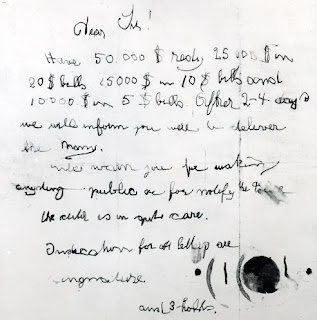Linguistic Fingerprints
There is an old adage about snowflakes that is often extended to fingerprints to say that both are unique and never the same. Some people have tried to say the same about language use. I honestly don't know who says language use is unique, because every time I come across the phrase "linguistic fingerprint" in a paper, it's when the author is disparaging the concept. The idea of linguistic fingerprint, sometimes idiolect, supposes that the way a person uses language is unique to each individual, like their fingerprints. "Linguistic fingerprinting" is a metaphor, not a method.
At the risk of looking stupid by talking about things I don't fully understand, it seems that the chances of a false fingerprint match are long odds to say the least. Some experts estimate that the odds of multiple minutiae points matching are in numbers that I think are in the negative-point-millions? (I'm really bad at math, I couldn't figure out the exponents.) Even in the case of Brandon Mayfield, an Oregon resident who was suspected of a 2004 bombing in Madrid because of fingerprint matching, a lot of human error was at play - some evidence was ignored and others exaggerated. Uniqueness aside, it is my novice understanding that most techniques of fingerprint matching work by recording multiple fingerprint minutiae points for comparison. Those collections of points become algorithms that can be tested for possible matches.
Then the metaphor falls apart because fingerprints never change, but a person's language use can change throughout a single day, across a lifetime, and even at will. The metaphor fails further if you try to extend the idea of a fingerprint database. The important thing to remember is that analyses of authorship focuses more on relative comparisons, not so much absolute data analysis. Linguistics is inherently subjective in that way.
The term "linguistic fingerprint" bothers a lot of forensic linguists. Some people love it, though - like law enforcement and journalists. It seems that we're stuck in a feedback loop of using the term as a metaphor to explain Authorship Attribution research to non-linguists, and then disparaging it when publishing that research. Meanwhile, I'm a neophyte in the field, internally conflicted about whether I would seem clever or pedantic if I tried to defend "linguistic fingerprint" as a partly apt metaphor. Instead, I have safely defended "linguistic fingerprint" as a partly apt metaphor in the comfort of my personal blog.

Comments
Post a Comment